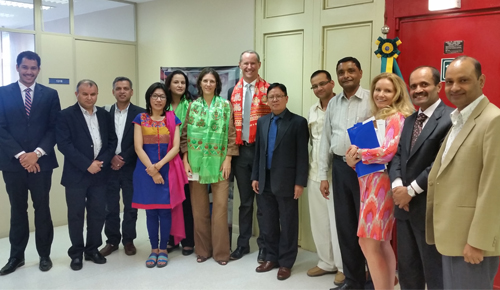Nepalese Delegation Visits the IPC-IG to Learn More About the Brazilian Social Protection System
The meeting was part of the agenda of the Nepal Government Mission to Brazil, aimed at promoting political support and strengthening public institutions and government agencies in the country

Brasilia, 7 April 2016 – The IPC-IG received representatives from the Ministry of Federal Affairs and Local Development (MOFALD) of the Government of Nepal, from the United Nations Children’s Fund (UNICEF) Nepal and from the United Kingdom’s Department for International Development (DFID) on 6 April, as part of a knowledge sharing activity on social protection and public policies. Led by Mr. Mahendra Man Gurung, the delegation traveled to Brazil as part of trilateral South-South Cooperation between Brazil, Nepal and Unicef.
Nepal has defined the Child Friendly Local Governance (CFLG), a strategy that places children at the centre of the development agenda by promoting children's rights through good governance at the local level. The aim of the mission was to learn about Brazil’s conditional cash transfers, most notably the Bolsa Familia Programme, from a policy perspective to the implementation mechanisms that allow the programme to be successful, as well as its multi sectoral and decentralized approach.
Knowledge Sharing Platform
Alicia Spengler, Senior Project Analyst at the IPC-IG, delivered a presentation on the work and mission of the Centre, followed by an introduction of the socialprotection.org online platform. She noted that six of the platform’s 800 members are from Nepal, highlighting that as more members join, more information can be gathered on the country’s social protection policies and experiences as well as other content, such as news, events and other materials.
Launched in September 2015, one of the most relevant contributions of socialprotection.org is its knowledge sharing tools, which include publications, webinars, online communities, specialised forums and events. Moreover, the platform is distinguished for its in-depth classification of social protection policies and programmes, along with a detailed description of relevant stakeholders and a range of publications related to the area—from academic research to official government reports. This broad range of tools can be used to foster discussions regarding a post-mission action plan for the delegation.
The Bolsa Familia Programme
Luiz Henrique Paiva, associate researcher at the IPC-IG, Ipea researcher and former National Secretary of the Bolsa Família Programme (BFP), presented Brazil’s most well-known conditional cash transfer (CCT), Bolsa Familia. It was created in 2003 to increase the efficiency and coherence of previous CCT programmes in Brazil, in order to reduce poverty and inequality and break the intergenerational cycle of poverty, while consolidating the basic social rights to education and health, and improving prospects in the labour market for its beneficiaries.
His presentation gave a well-rounded overview of the programme, covering its main characteristics such as benefits and conditionalities, to its budget, evolution, institutional frameworks, the Single Registry, as well as complimentary programmes and remaining challenges.
“In addition to being the most progressive transfer in Brazil, Bolsa Familia is the most cost-effective way to fight extreme poverty in the country”, said Mr Paiva, adding that the BFP’s budget totals for 0.5% of the country’s GDP.
By Cecilia Amaral